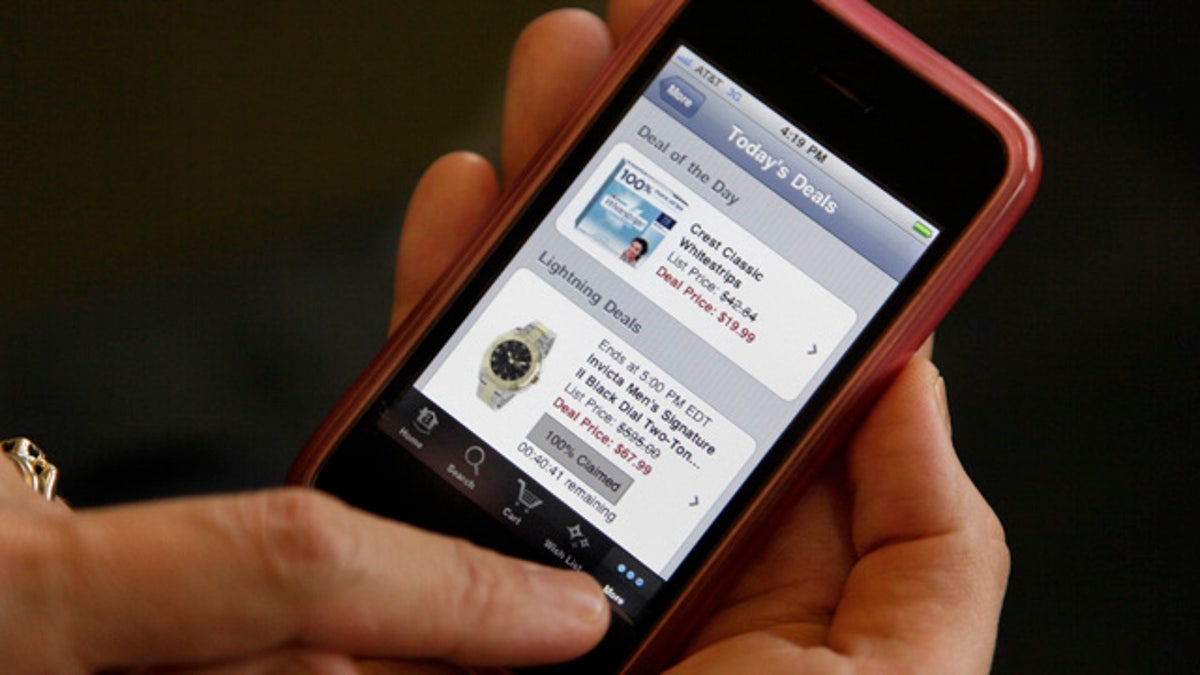
Smartphones are taking over. Do you still need a PC? (AP Photo/Richard Drew)
Americans really, really like their smartphones.
In fact, Americans like smartphones so much that an uncanny number of them are ditching traditional computers altogether for the carry-all convenience of their increasingly potent iPhones, Androids and Blackberries.
"Limiting my Internet usage to only my iPhone provides clarity and focus that is not available with traditional computers," Kurt Elster, a commercial artist from Chicago, told FoxNews.com. "I also enjoy having my computer in my pocket -- something not readily available with even the smallest of laptops."
He’s not the only one. According to a July survey by the Pew Research Center, one in four smartphone owners (22 million people in total, about as many as those rabid Mac owners you often encounter) prefer to connect to the Internet from their smartphone rather than their computer. About a third of them don’t even bother with high-speed home networking.
Sales of smartphones are through the roof, of course: Gartner noted an 85 percent year over year increase in smartphone sales in the first quarter of 2011. The research company also saw slumping PC sales in the second quarter of 2011, with shipments falling 5.6 percent.
That's partly due to the rise of tablets, which are expected to help kill traditional PCs. While smartphone enthusiasts expressed interest, the vast majority still preferred the portability of their phone over other devices.
"I've expanded my repertoire to an iPad, but I prefer to use my smartphone for everything that can't be done without a mouse and keyboard," said Mary Tamargo, a smartphone user of seven years.
And as smartphones become more widespread and powerful, some users are outright replacing their traditional (and far more expensive) desktops and laptops with them.
Take low-to-middle-income urbanites, for example. Many of them don’t own a computer, so the easiest and cheapest way for them to access online resources is by smartphone, according to a recent study by Fjord, a mobile research and design company.
"Many of our interview subjects attested that their first exposure to the Internet occurred on a smartphone or cellphone, not a desktop or laptop," a representative told FoxNews.com.
But given the option, why would anyone favor computing on such a small device?
A smartphone goes where a computer can’t, said Dan Nainan, a comedian from New York. "My phone guides me from place to place, informs me if my flight is delayed, has an app that lets me make free overseas phone, and even has a guitar tuner," Nainan told FoxNews.com.
"Even if a laptop were able to do all this, can you imagine how cumbersome it would be to open it up, wait for it to boot, and then load the information?"
Sharon Chayra of Las Vegas echoes the mobility benefits. "My iPhone is portable and convenient," she said. "Not only do I use it for email and scheduling but also reviewing art files, shopping, and converting dollars when abroad. Some goes to Facebook too," she added with a smile.
Jason Marshall, a publicist from New York, told FoxNews.com that even at home, smartphones are simply handier. "To be honest, sometimes I'm just too lazy to get up, start-up my computer and use the Internet," he admitted.
Marshall’s aging and buggy laptop has become so neglected, in fact, that he’s considering replacing it with an iPad -- which he calls "a large version of my phone."
What about computer users who write a lot? If there’s one thing smartphones aren’t good for, it’s inputting large amounts of text, right?
"That’s what I have an external keyboard for!" Nainan said enthusiastically.
Marshall has found a workaround. "If I need to update a doc, I just copy the text from the attachment and paste it into the phone's notepad feature to edit," he said. "Then at work the next day, I paste it back into Word."
Others, like Chicago artist Elster, occasionally borrow a keyboard while at work. Others just adapt. An old boss of mine can type 55 words per minute with his dual-action, lighting-fast Blackberry thumbs. He's even filed 2,000-word blog posts from his phone.
Still, there are some things smartphones just can’t do, at least not yet. Presentations and spreadsheets are chief among them, not to mention a host of other specialized software applications.
That hasn’t stopped avid users from dreaming of an all-smartphone world. "If it weren’t for music recording and voice dictation, I could ditch my laptop entirely," Nainan said.
Kate McGinly of Pittsburgh, who abandoned her laptop a year and a half ago, said it’s only a matter of time.
"This is the direction in which computing is headed," she told FoxNews.com. "With powerful apps and cloud storage, I can’t think of anything I’d need a laptop or desktop for."
About the author: Blake Snow is a freelance writer from Utah. He wrote this story on a spacious desktop computer and largely views his smartphone as a work leash. He can be reached at blakesnow.com








































